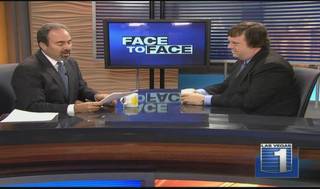Thursday, May 21, 2009 | 1:02 p.m.
Wrong Turn

Viewing video requires the latest version of Adobe's Flash Player
Sun archives
Gary Loveman, CEO of the world’s largest casino operator, said during a television interview Wednesday that Harrah’s Entertainment is in a more stable place than last fall and earlier this year.
The company last month reported a loss of $127.4 million for the first quarter of 2009 compared to a $275 million loss in the same quarter of 2008. Loveman explained to Sun columnist Jon Ralston during an interview on “Face to Face” that while the business is making money, companies like Harrah’s are simply spending more cash in interest payments than they’re bringing in.
“The underlying fundamental health of the industry remains strong. The issue is to address the capital structure and that’s what companies like we and MGM Mirage and Station [Casinos] have struggled to do,” Loveman said.
While casino operators like MGM Mirage, Wynn Resorts and Las Vegas Sands recently have made multi-billion dollar expansions, Harrah’s has not made recent acquisitions or laid out plans for any new property. Loveman said seeing the financial distress some operators are under, he’s relieved Harrah’s stood back.
“We didn’t undertake a $4 or $5 billion project because we couldn’t see how we could make it work. We’re criticized for having some buildings that in some respects are less opulent than some of our competitors but that’s because we looked at the potential returns even under the best economic situation,” Loveman said.
Harrah’s did announce in January that it would delay the opening of its sixth hotel tower at Caesars Palace due to the economy. The 660-room tower was part of the resort’s $1 billion expansion project.
Loveman said during the “Face to Face” interview that he recalls when five multi-billion dollar expansion projects on the Strip were announced, thinking the developments were over the top. A recession later, all that is left of those projects is CityCenter, Loveman said. But the former Harvard Business School professor said the economic downturn is not the only factor in their failures.
“It’s not just the recession,” Loveman said. “It’s that the industry has generally tried to compete largely on the opulence of the box in which the central product is delivered.”
When asked whether he thought some casino operators were thinking too big, Loveman said, “I think they worked under a set of assumptions that saw very favorable conditions on almost every angle of the work that went into the project. When those are challenged because financing become too expensive, consumer behavior is mitigated in some way, the economy turns down, it becomes very hard to make those projects work.”
Loveman also disagreed with a statement casino mogul Steve Wynn made last month on the same television program. During an April interview on “Face to Face,” Wynn criticized casino operators for the “bundling” of properties on the Strip.
“The town’s history has been based on competition, diversity of ownership -- smart groups of guys fighting it out. Getting the best deals by having competitive advantages,” Wynn said in the April interview. “When you bundle things up in giant corporations like Harrah’s or MGM Mirage, to me it’s not a Las Vegas thing.”
Loveman said while he admires Wynn, his theory is off base.
“I think he gets it completely wrong in this case,” Loveman said. “I think there is no absence of competition in Las Vegas. There’s been tremendous entry by people like Steve Wynn and Sheldon Adelson and Echelon … you pick your favorite case. Competition has been vigorous indeed.”
As for the possible sale of some Harrah’s properties, Loveman said, “It’s certainly possible but there is nothing pending at the moment at the top of our list.”
Like most other casino operators in today’s economy, Harrah’s has made cuts in its workforce to adapt to lower visitor numbers and reductions in consumer spending. The company’s worldwide workforce fell to 80,000 workers at the end of 2008 from 87,000 a year earlier.
Loveman said the challenge is not losing quality during staff reductions.
“I tell my colleagues all the time that for the visitor who is with us during the difficult time, that’s an even more dear visit than it was when times were good,” Loveman said. “They expect us to do an even better job, not to put on their backs the fact that the economy is weak.”
Over the next few quarters, Loveman said Harrah’s will see a lessening of its interest burden as a result of a recent debt exchange. The exchange cut Harrah’s debt by $2.3 billion and reduced yearly interest costs by $104 million.
Just as distinctive as it's famous neighbors Caesar's Palace and The Venetian, Harrah's Las Vegas has been entertaining guests since 1973. The 87,700-square foot casino is filled with 1,520 slot machines and 107 gaming tables. Outside the casino, guests are able to experience fun in a street-fair atmosphere at the Carnival Court, an outdoor lounge with live entertainment (including the bartenders), food stands and outdoor shops.
At Harrah's comedy is King, and that has never been more apparent then the comedy acts of Rita Rudner, the Mac King Comedy Magic Show and the Improv Comedy Club. After the show, guests are more than welcome to laugh at their friends at The Piano Bar, famous for its dueling pianos and karaoke. Most recently, Harrah's added tribute show "Legends in Concert" to its list of entertainment.
Restaurants like Ming's offers Asian cuisine, while Ruth's Chris Steak House offers guests fine steaks and fresh seafood. Toby Keith's I Love This Bar is a country-themed bar with a restaurant, live music and the occasional appearance from Keith himself.

Join the Discussion:
Check this out for a full explanation of our conversion to the LiveFyre commenting system and instructions on how to sign up for an account.
Full comments policy